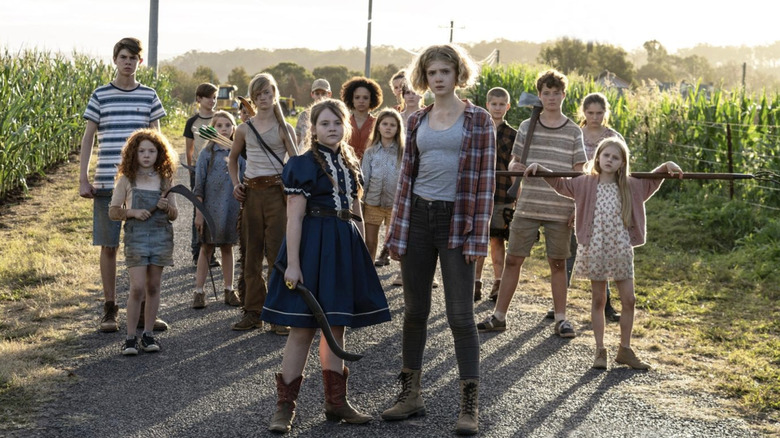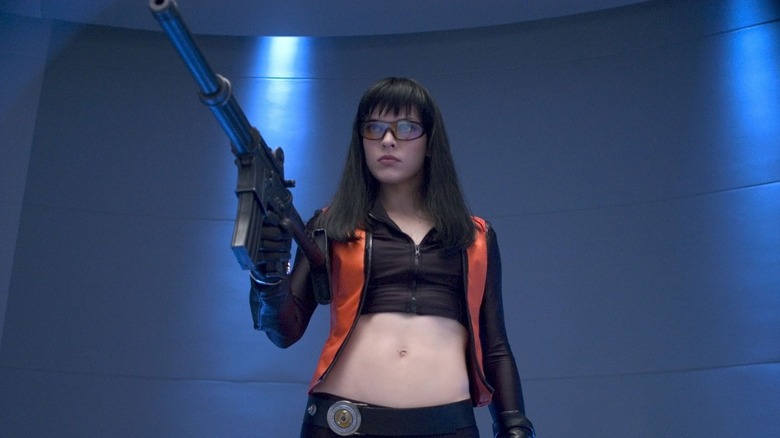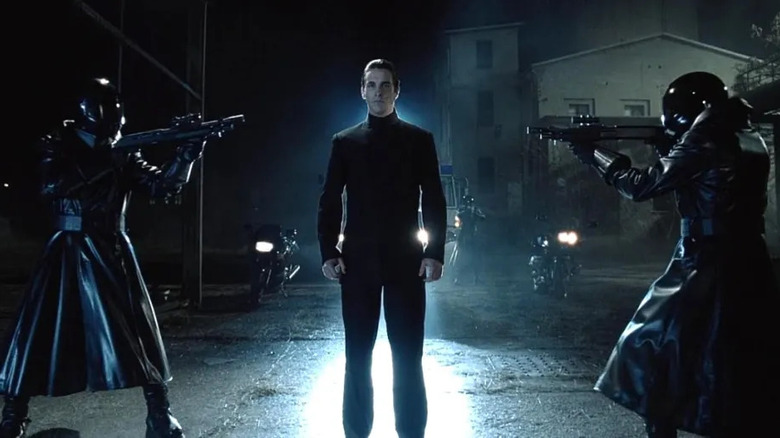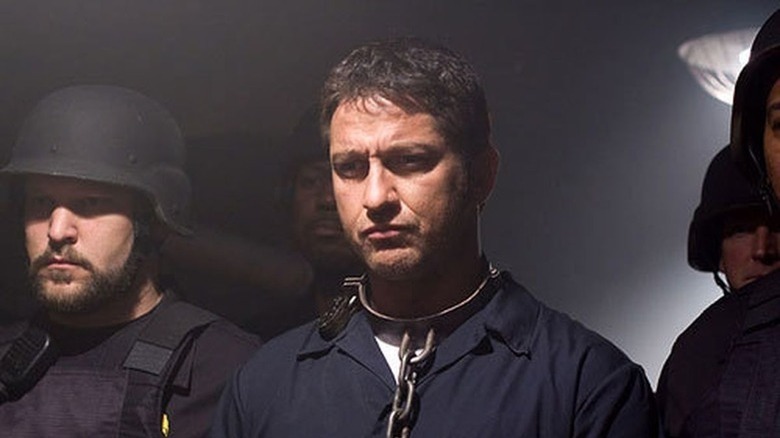Children Of The Corn Director Kurt Wimmer On Four Decades Of Writing [Exclusive Interview]
Screenwriter Kurt Wimmer cooks pure popcorn. More accurately, in his own words, he builds powder kegs. He fills barrels with gunpowder, he lights the match, and then lets it all blow on the page. It's a formula that's led to Wimmer writing or co-writing hits such as "The Thomas Crown Affair" remake, "Salt," "Law Abiding Citizen," and "Street Kings."
As for his directing credits, he's the man behind gun kata in the cult action favorite, "Equilibrium." Following the 2006 release of his second directorial effort, "Ultraviolet," he committed full-time to writing, but he returned to the director's chair for a remake of "Children of the Corn." For Wimmer, that decision had little to do with the original Stephen King story or past adaptations.
"Children of the Corn" isn't Wimmer's only new project. He created a YouTube channel showing him writing a new spec script, "Fortunate Son." Recently, we talked to Wimmer about "Children of the Corn," his YouTube channel, his approach to structure, and why he has to write every day.
Note: This interview has been lightly edited for clarity and brevity.
'You build it right, and then you light that f***er and you watch it go off'
What made you want to start a YouTube series, showing you write as you go?
Oh, you know about that? I didn't think anybody knew about that. I'll tell you, I don't know what I got myself into. I'm writing all the time, sometimes I'm writing 10 scripts a year or something like that, and that's features on top of everything else. I thought, well, why don't I record it once? It's not for everybody, but some people might find it valuable.
I find people who've never done it before, they can't get their arms around what it means [to write a script]. It's like why people don't undertake diets. They say, "I want to lose 15 pounds," but they don't know how long it's going to take. And so, they go at it hard for a month, but then they're like, "Okay, I don't know how long this is going to take." By putting it into a box for people, it'll help some people say, "I can get it done over this period of time. This is something I can get my arms around. This is something I can do. I can take a vacation, a two-week vacation or a three-week vacation a year. I can get it done." As opposed to, "Is this going to take me a year?" or "Is this going to take me two years?" Which is, I think, something that will deter a lot of people.
So that's why I'm doing it. At the same time, I'm suddenly like, "Why did I do this? Why did I sign myself up for this?" But it's an interesting experiment and I fully intend to go make the movie. There's a lot to be done between now and then, but I intend to get it made. I want to take everybody on this journey. I want to include them in writing it, but also going to my agent, the town, going to directors and actors, and during the studios and executives and notes and every email, every phone call. I want to include everybody. If we get to that part, it should be pretty interesting.
You break down a film's structure as a powder keg. First act, you fill it with gunpowder. I won't butcher the rest, but have you always approached scripts with that outlook?
I'm glad you asked. Structure is the most important thing. It's the only important thing, but the irony is it doesn't exist. There's no such thing as structure. Structure, in the universe without human beings, if a tree falls in the forest and nobody sees, did it fall? Well, if a dog looks at a script, does a structure exist? No, it doesn't. That's something we do as human beings. Movies are designed to please human beings, and human beings only. If an alien watched a movie like, "What the f*** is this? This is not pleasing at all. It takes too long or goes too fast." Literally over this viral petri dish, Hollywood has created this art form that it is all about, in the most commercial sense, impacting human beings in the most volatile way possible.
So that's what structure is, but it doesn't really exist. To talk about the first act, second act, or third act, it's a convenient way to talk about it. Bones of those things actually exist. You cannot mathematically prove the existence of a first act. I like to think about it in terms of it's always emotional. Everything's emotion. So that's why I use the concept of the powder keg. It is something that has evolved. When I first started writing, I didn't understand structure at all. It's learned from endlessly writing. Eventually you start to get it instinctively. You got to listen to yourself, listen to the writing, listen to the page, and you're like, okay, it's time to get out of here. It's time to move on.
The first act is you're on a beach and you've washed up on shore, and there's some wood lying around and some gunpowder. Maybe there's some black powder, and there's some phosphorus or whatever they put in there. And you build it. Those are the parts of the characters. You build the cast that you put it in and you mix the gunpowder, you pack it in, just the right amount, because you know what size explosion you want. You want a big explosion. How big of an explosion do you want? How far is the debris going to be thrown? You build it right, and then you light that f***er and you watch it go off.
If you packed it right, when it blows up, the script will write itself. If you have done your first act right, it will write itself without any problems whatsoever. It's up to you at that point to have as much fun as possible and film the explosion in as many different ways, the outcomes of it, and the ramifications downstream in the best way that you can.
'Ultraviolet was not considered a success, but people have grown to like it over time'
When you work from a story by Stephen King, does that help you at all along that journey?
In this particular respect, it helps tonally. One thing I'm good at is imitating other people's work, other people's voices. I'm sort of a cypher in that way. The movie is nothing like the original story, except that when I read this story, it is extremely elastic. I mean, there's not really a story there, but's a model for speaking about generational warfare, in my view. I looked and I said, "This is as simple as Romeo and Juliet with two people in love." Well, it's as simple as that with children wanting to kill their f***ing parents. It has been happening since the beginning of time that 16-year-olds, or my 14-year-old daughter, for instance, wants to kill me, but they want to kill you for different reasons.
I thought the fundamental structure could conform to almost any different time. Like Romeo and Juliet, you can take the skeleton of it and tell the same fundamental story, but with different implications in different eras. I looked at this and I said, "Oh, 'Children of the Corn,' that's about the earth." Corn is one of the greatest shorthands for the earth. The only better one might be wheat, and children are shorthand for the future. I looked at it and said, "This is talking about the relationship between the children, the future, and the earth."
You ask yourself, "Well, why are children killing parents?" It's pretty clear, especially in this world where we have a lot of politicians who are of an age, and yet that they're not going to be living in the future, making the policies for the kids have to live in it, but they don't have any say in it. It's poetic. There's subtext in the very title, "Children of the Corn," which is another way of saying children of the earth. So that was helpful; the spirit of that was always present. And then, of course, taking Stephen King's tone and trying to do my best to honor that in the movie.
Was this your first King adaptation? Were you ever hired before to write one?
No, I wasn't even been hired to adapt that one. I just did it. I mean, I had a friend call me up and say, "Hey, you know what, we think we have the rights for this, actually." I said, "Oh, really?" Then I just went and wrote it. I didn't even tell him because it was so apparent to me it was a movie that was relevant.
Why was there such a long wait for you to direct again? Was it a deliberate choice?
It's hard to get movies made, but I made a movie called "Ultraviolet" back in 2006, which didn't do very well. Although it's weird, because the expectations of the box office had changed. If the movie were to come out today and did what it did — it did $4 million less than "Knock at the Cabin," and it cost the same amount. Now, "Knock at the Cabin" is [considered] a huge success. It's weird. Things have really changed. "Ultraviolet" was not considered a success, but people have grown to like it over time.
In any event, it became clear to me at that point that I had to separate my careers, writer and director, because I couldn't let one destroy the other. I said, "I'm just going to focus on writing. I'm going to get a bunch of movies made." I did, and then I said, "I'm ready to get out of this office. I want to go out in the world again."
'The critics hated it, but the public loved it'
Was it a hard choice or not to step away from directing? If I'm not mistaken, "Equilibrium," even though there's a lot of love for it now, didn't get the best release either, right?
Well, no, not at that time. I mean, everybody loved "Equilibrium." I mean, the critics hated it, but the public loved it. They just loved the movie. So, that was enough for me because I was like, "Okay, I don't really f*** with the critics." Now, that's what you always say when the critics pan your movie. You say, "I don't care what they think." The moment before they panned your movie, you did care what they thought, but then you quickly changed your mind. Honestly, the truth is, I would much rather have the people out there saying, "I love that movie. I really, really dug that movie," or, "That movie really changed my life." That's so much more important. It was enough to keep me going, for sure.
What happened with "Equilibrium" was Columbine. Miramax and Dimension were really behind the movie. They were excited about the movie, and then Columbine happened, and the MPAA is what changed. They started instituting these strict rules about what could be shown in trailers. Essentially they said, "You can't show a gun in the trailer." You know, there are some guns in "Equilibrium". You can't take the guns out. So they didn't know how to sell it. It got kind of screwed by Columbine.
That movie introduced a lot of people to gun kata. Were you aware it was new for audiences?
It's a good thing I didn't think about it too much. If I had, I probably wouldn't have done it. I created the gun kata right here in the office where I'm writing every day. If I had thought about it, I probably would realize, "Holy s***, this is really stupid," but I didn't. I just thought this is really cool. It's not realistic, but it's so cinematic. It's what I love about cinema is the musicality and the dance between camera and action. On top of that, you can find a wonderful character's journey along with it.
I didn't really quite realize, to your point, that it would ignite people's imaginations. And in Japan they would start doing cosplay, gun kata cosplay, etc., which they do for "Ultraviolet" as well. Even video games start to become based around that idea. I did not think that far in advance.
Something I like about your writing is you're someone who goes where the fun is. It's total movie logic. For you, what's the balance between fun or plausibility?
Well, everything has to be logical. I believe my scripts are logical, because they're not about quantum mechanics. I believe that they're fundamentally logical. I mean, if you want to say, "Well, how does somebody dig a tunnel into jail," it actually turned out that El Chapo did it. Now, he did it after "Law Abiding Citizen." I think he copied the movie, but they literally tunneled into jail. So, these things are possible. They're unlikely, but they're possible.
Here's the thing: You are going to the movies to be entertained. I know it. I want to be entertained when I'm writing it. I also know that you get no points whatsoever for logic if it's scarified for ... you know, I love "The Matrix," but come on, humans as batteries? I mean, why didn't they use elephants? That seems like it makes a lot more sense. How about fish? There's millions of fish out there. By the way, who put Joey Pants into the Matrix to eat that steak? I don't care, because it was entertaining, right?
There's a fine line, though. I mean, you can't push them too much, but the audience, for the most part, they just want to know you thought about their concerns. That's all they want. And then they want to be entertained.
'I get depressed if I'm not writing'
What exactly did you mean earlier when you said you're good at imitating other voices?
Oh, I'm just very good at it. It's the voice on the page. I sort of create my own internal subroutine of them in my head, and I become that writer. Not everything I've written by any stretch of imagination has been made, so I may not be talking about ... let me give you an example. I'm not quoting actual writers, but if you look at my work, if you were going to look at "The Thomas Crown Affair," "Equilibrium," "Law Abiding Citizen," and you look at "Salt," or "Spell," I don't know if you saw that movie.
Yeah, the horror movie. I saw it.
By the way, that was an unofficial adaptation of Stephen King, which is "Misery." If you look at them, they're vastly different tones, vastly different. You can't look at those things and identify they're by the same writer. You can to some extent, because my structure is always very similar. It accelerates, it always has reversals and surprises, and then it starts to accelerate, so you lean forward and lean forward. But that's the only thing that's, I think, identifiable about my writing, where you can say, "Oh, that's something that Kurt Wimmer did." Tonally, "Equilibrium" and "Thomas Crown" could not be further apart.
But it still makes sense it's the same writer.
It's the energy in the structure. As you brought up earlier, it's the hunger to entertain. Really, I write to entertain myself. It's a bonus that sometimes they get made and other people are entertained.
You've had a lot of movies made, and something else that's unique about your career, you've had longevity.
What? Four decades.
What do you attribute that to? Not a lot of screenwriters enjoy the success you've had.
Well, because not a lot of writers enjoy writing. They don't like to write. Okay, there's a number of answers to this question. First of all, I write spec scripts and most writers don't write spec scripts. They start writing spec scripts, because it's the only way to break into the industry. I can't tell you how many writers sell their first spec script and the first thing they say is, "Thank God, I don't have to write another spec script." They're wrong. I mean, I wrote "The Beekeeper" [on spec], which I sold last year. It's all about writing spec scripts, which becomes problematic in this age of IP where everything is based on IP and fewer spec scripts are getting made, particularly at budgets like "The Beekeeper" was made.
I just love writing. I came here to write. I didn't come here to execute somebody else's imagination or story. I came here to tell my story, the stories I want, the way I want to do it. That's why I came here. I mean, sure, they pay you. It pays well to go in and take these studio assignments, but it's kind of soulless work to rewrite somebody else's script. Great, but I feel bad for me and I feel bad for them, but somebody's going to do it.
I just work, work, work. I'm going to write seven days a week. I still do. I get depressed if I'm not writing. After I've written for the day, I feel okay. It's kind of like a heroin addict. You get that fix and you're like, "Okay, I can make it until tomorrow." I tend to outwork people. I don't think anybody works harder than I do. I don't think so. I love it. I think those two things, if I had to think about it, would contribute to the fact that I've been selling spec scripts for four decades.
Do you have one or two spec scripts, in particular, you'd love to see get made tomorrow?
I've got hundreds of them.The things that are at the top of my list are a couple of things I want to direct. I don't want to direct everything I write, and that doesn't have anything to do with what I perceive as the quality of it. It has to do with, well, something that hooks with me and intrigues me. I'm intrigued by the problems of directing certain things. So those scripts are at the top of my list, but they're all my children and I want to make them all. I want to make 50 more films before I die.
"Children of the Corn" is in theaters now.




